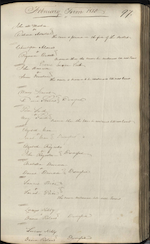The digital collection of Indiana Territory Court Orders is a collaborative effort between the University Library, the Indiana State Archives, and the Historical Society for the United States District Court for the Southern District of Indiana. This collection contains digital images of three order books: 2 original volumes created between 1800 and 1816 and a late nineteenth-century transcription for the first 114 pages of Order Book 1 (which were heavily damaged). We used Order Book 2 in its entirety. The two order books are a combined 578 pages in length. Created by the Clerk of the Court of Indiana Territory, Henry Hurst, the order books document the court’s actions in chronological order by court term from March 1801 to December 1816. This collection also contains the Chancery Court orders of 57 pages, recently found. The Indiana Territorial Legislature created the Chancery Court in 1805. Chancery Court judges, called chancellors, solved conflicting claims when common law and statute law offered no solutions. The Chancery Court operated between 1805 and 1814; however, the extant records only cover August 1807 to September 1811. The Indiana State Archives holds the original Indiana Territory Order Books, transcribed order books, and Chancery Orders.
The digital images of the collection are in chronological order and are searchable by terms. Each entry by the clerk has been identified and labeled using 16 characteristics: order number, page number, case type, court order, action, keyword, image file number, named roles, names, social, geographic place names, location of court, date of court, volume, and court term. Consult a legal dictionary such as Black’s Law Dictionary for unknown terms or terms with more than one meaning.
To keep matters simple the project has not included from the database terms that would apply to all cases such as plaintiff and defendant. In general we have maintained historic identifiers included in the records such as yeoman, slave, and Indian. However, in instances where there are multiple historic terms such as mulatto, negro, and possibly slave, we have simply used African-American as the more appropriate universal term. Children regardless of gender have been identified as child. Several cases identified an animal such as a horse, a cow, or a pig all of which have been designated “animal.”
In general all cases related to disputes or crimes in Indiana Territory. However, occasionally evidence, witnesses, or offenders related to states or other territories. When the location was identified in the record, it has been listed.
While characteristics like order number, page number, and date of court are self-explanatory, “named roles” and “social” require explanation. Named roles are those designations chosen by the clerk of the court. For the most part named roles used in the order books parallel modern usage; for example attorney, coroner, and fugitive. A few terms such as elisor and next friend might require a legal dictionary. The characteristic “social” refers to identities in the text like ethnicity -- French or Swiss. Other social terms relate to status, such as esquire or gentleman, and/or affiliation, such as friend or husband.
Included in this collection are vocabulary lists for named roles, social, and legal terms.

